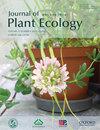长期加磷对三种热带森林土壤磷单酯酶与磷二酯酶比值的影响
IF 3.9
2区 环境科学与生态学
Q2 ECOLOGY
引用次数: 0
摘要
热带森林中的土壤微生物可以通过改变不同类型磷酸酶的活性比率来适应贫磷条件。我们测试了贫磷热带森林土壤中的微生物是否增加了磷酸单酯酶(PME)与磷酸二酯酶(PDE)的活性比,因为与二酯磷降解的两步反应相比,单酯磷降解一步酶反应可能更适合微生物获取磷。在三个热带森林中进行了连续10年的磷添加实验。PME和PDE的活性及其在土壤中的比例是在这样的假设下确定的,即磷短缺得到缓解的磷施肥地块的PME:PDE比例将低于未施肥对照。我们证明,在热带森林土壤中长期添加磷不会改变原始林和次生林的PME:PDE比率,而施磷会提高人工林的PME:PDE比率。这些结果与之前的结果形成对比。在我们的研究中,长期、大规模的磷施肥可能减少了枯枝落叶和/或通流衍生的PDE,这抵消了通过外源磷输入降低的PME:PDE比率。本文章由计算机程序翻译,如有差异,请以英文原文为准。
Effects of long-term phosphorus addition on soil ratios of phosphomonoesterase to phosphodiesterase in three tropical forests
Soil microorganisms in tropical forests can adapt to P-poor conditions by changing the activity ratios of different types of phosphatases. We tested whether microorganisms in P-poor tropical forest soils increased the phosphomonoesterase (PME) to phosphodiesterase (PDE) activity ratio, because a one-step enzymatic reaction of monoester P degradation might be more adaptive for microbial P acquisition compared to a two-step reaction of diester P degradation. A continuous 10-year P addition experiment was performed in three tropical forests. The activities of PME and PDE, and their ratio in soil, were determined under the hypothesis that the P-fertilized plots—where P shortage is relieved—would have lower PME:PDE ratios than the unfertilized controls. We demonstrated that long-term P addition in tropical forest soil did not alter the PME:PDE ratio in primary and secondary forests, whereas P fertilization elevated the PME:PDE ratio in planted forest. These results were in contrast to previous results. The long-term, large-scale P fertilization in our study may have reduced litter- and/or throughfall-derived PDE, which negated the lowered PME:PDE ratio via exogenous P inputs.
求助全文
通过发布文献求助,成功后即可免费获取论文全文。
去求助
来源期刊

Journal of Plant Ecology
生物-植物科学
CiteScore
4.60
自引率
18.50%
发文量
134
审稿时长
3 months
期刊介绍:
Journal of Plant Ecology (JPE) serves as an important medium for ecologists to present research findings and discuss challenging issues in the broad field of plants and their interactions with biotic and abiotic environment. The JPE will cover all aspects of plant ecology, including plant ecophysiology, population ecology, community ecology, ecosystem ecology and landscape ecology as well as conservation ecology, evolutionary ecology, and theoretical ecology.
 求助内容:
求助内容: 应助结果提醒方式:
应助结果提醒方式:


